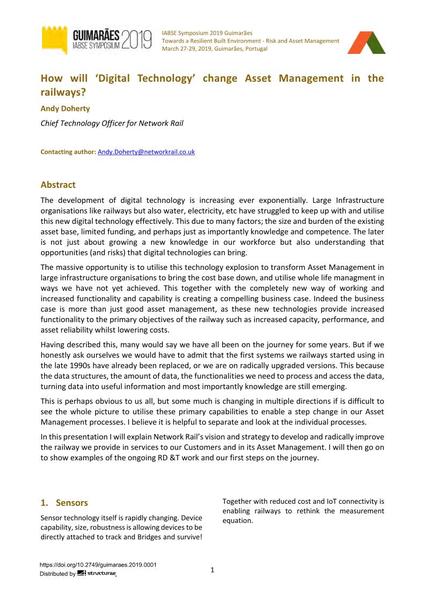How will 'Digital Technology' change Asset Management in the railways?

|
|
|||||||||||
Détails bibliographiques
| Auteur(s): |
Andy Doherty
(Chief Technology Officer for Network Rail)
|
||||
|---|---|---|---|---|---|
| Médium: | papier de conférence | ||||
| Langue(s): | anglais | ||||
| Conférence: | IABSE Symposium: Towards a Resilient Built Environment Risk and Asset Management, Guimarães, Portugal, 27-29 March 2019 | ||||
| Publié dans: | IABSE Symposium Guimarães 2019 | ||||
|
|||||
| Page(s): | 1-3 | ||||
| Nombre total de pages (du PDF): | 3 | ||||
| DOI: | 10.2749/guimaraes.2019.0001 | ||||
| Abstrait: |
The development of digital technology is increasing ever exponentially. Large Infrastructure organisations like railways but also water, electricity, etc have struggled to keep up with and utilise this new digital technology effectively. This due to many factors; the size and burden of the existing asset base, limited funding, and perhaps just as importantly knowledge and competence. The later is not just about growing a new knowledge in our workforce but also understanding that opportunities (and risks) that digital technologies can bring. The massive opportunity is to utilise this technology explosion to transform Asset Management in large infrastructure organisations to bring the cost base down, and utilise whole life managment in ways we have not yet achieved. This together with the completely new way of working and increased functionality and capability is creating a compelling business case. Indeed the business case is more than just good asset management, as these new technologies provide increased functionality to the primary objectives of the railway such as increased capacity, performance, and asset reliability whilst lowering costs. Having described this, many would say we have all been on the journey for some years. But if we honestly ask ourselves we would have to admit that the first systems we railways started using in the late 1990s have already been replaced, or we are on radically upgraded versions. This because the data structures, the amount of data, the functionalities we need to process and access the data, turning data into useful information and most importantly knowledge are still emerging. This is perhaps obvious to us all, but some much is changing in multiple directions if is difficult to see the whole picture to utilise these primary capabilities to enable a step change in our Asset Management processes. I believe it is helpful to separate and look at the individual processes. In this presentation I will explain Network Rail’s vision and strategy to develop and radically improve the railway we provide in services to our Customers and in its Asset Management. I will then go on to show examples of the ongoing RD &T work and our first steps on the journey. |
||||
